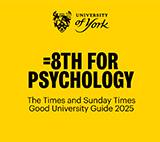
Hallucinations in different sensory modalities across the psychosis spectrum
Tuesday 17 January 2023, 4.00PM to 5.00pm
Speaker(s): Professor Rob Dudley, University of York
Abstract:
Hallucinations are the experience of perceiving something that is not actually there. Auditory hallucinations, or hearing voices, is a key feature of psychosis. Such experiences are often distressing and disabling and psychological therapies have been developed to try to help people better manage these issues. However, to date the therapies have only a modest benefit. To help improve the impact of the help we offer people it could help to take a causal interventionist approach. This involves establishing and targeting the processes that lead to and or maintain these issues. Such causal interventionistic approaches have proven to be of immense value in helping other features of psychosis like paranoid thinking but have not yet been applied to hallucinations.
In relation to hallucinations, it has become increasingly evident that people report hallucinations in a range of senses. The focus on auditory experiences is understandable given their prevalence and impact but it may have led to a neglect of the actual experience of the person and mean the treatments we have are mismatched to the person’s needs. In this talk I will present recently collected data that describes hallucinations across a range of sensory modalities (visual, olfactory, gustatory, tactile and auditory) reported in three groups including non-clinical participants, people at higher risk of transition to psychosis and a group with an established first episode of psychosis. Rates of hallucinations across sensory modalities will be presented, along with key information about how the experiences change as people move towards psychosis.
In addition to this phenomenological description candidate mechanisms that may contribute to the experience of hallucinations are examined. Imagery and dissociation are explored in the non-clinical sample. and source monitoring (or how people determine the origin of perceptual experiences) is considered in relation to the first episode group. Better understanding of these mechanisms could point the way forwards for future treatment targets.
Location: PS/B/020
